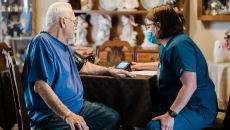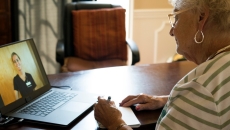Bill Siwicki
Incorrect, outdated or incomplete utilization data may not accurately reflect the underlying health risks and needs of disadvantaged populations, according to new research from the Terry Group, which offers strategies to address the challenge.
The CIO at a Denver behavioral health center talks about how NLP can help with behavioral health, what it will take to get more providers to adopt the AI technology – and how it can help with managing social determinants data.
People with disabilities often are faced with higher rates of chronic conditions and experience a higher rate of financial difficulty covering the costs of care.
Low-touch digital apps and high-touch telehealth don't fully address the lack of capacity in behavioral health – VR can, says one psychologist, who explains how.
"VR's level of genuineness gives users a truly authentic experience that you see and feel immediately," says one surgeon, who offers an in-depth look at the technology. "It's wildly impressive."
"We have learned more about the huge technological and digital access barriers that many of our rural patients face," the director of patient engagement at Community Health Center of Southeast Kansas says.
The University of Maryland School of Medicine has expanded its telemedicine program to help reach vulnerable patients in need of care, regardless of location or technological savvy.
An Oracle Cerner registry and reporting tool was implemented in the nick of time for the pandemic. The Wyoming health system, now saving many hours per week, is applying lessons learned to the impending flu season.
What do physician group EHRs need to include over the next decade? What are differences between GP and specialist systems that must be considered as the technology evolves? One expert offers advice.
Remote patient monitoring and visiting nurses, triage telehealth for the ER, boosting behavioral health with telepsychiatry – Southcoast is deep into virtual care.










